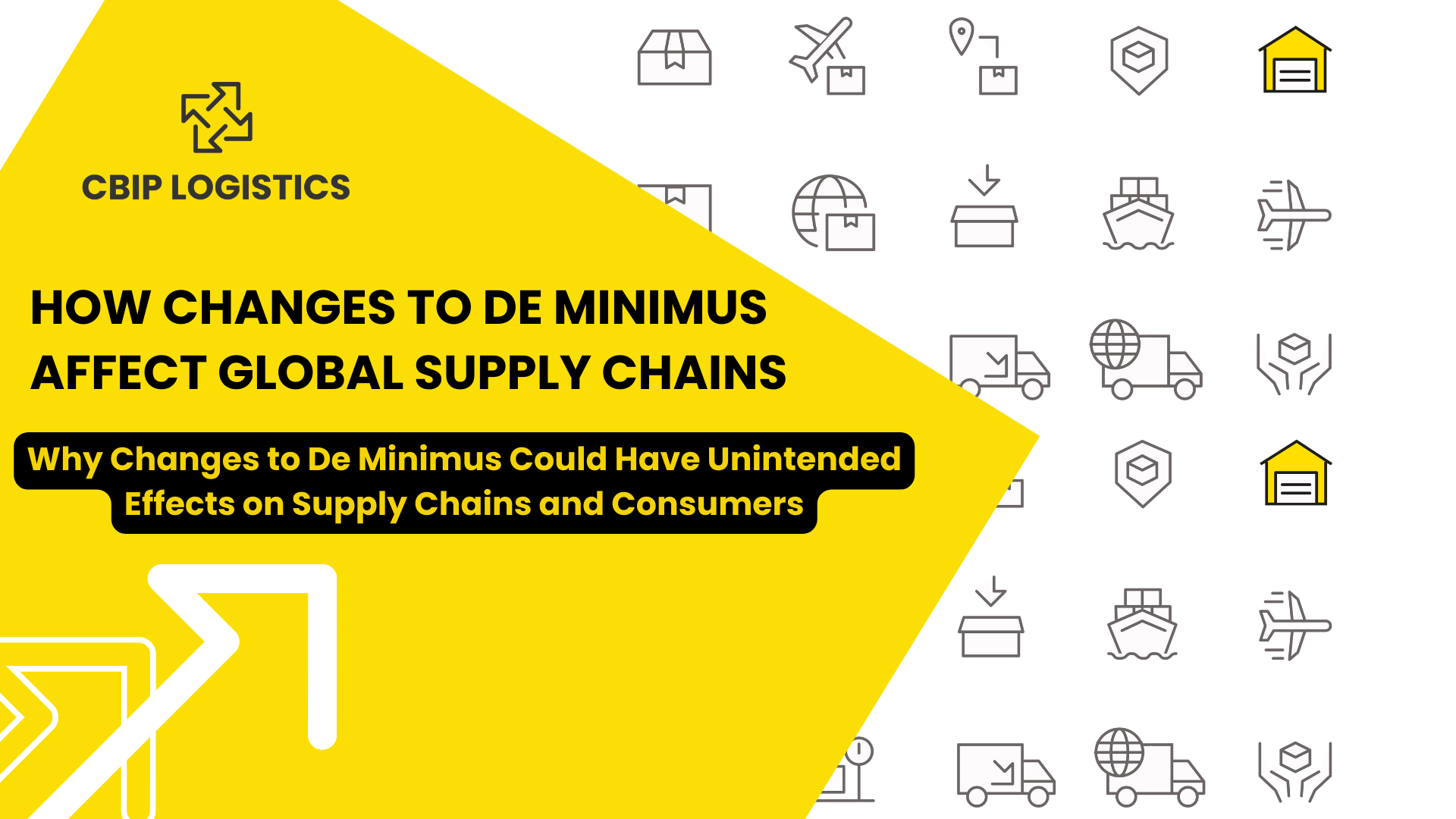How Changes to De Minimus Laws Affect Global Supply Chains

Since the 1930s, de minimus laws throughout the world have allowed low-cost imports to pass through customs without incurring duties.
This law has existed for almost a hundred years, so why all the attention now? If you’ve been watching headlines, you know it’s because of unfair foreign competition: Chinese fast fashion companies are taking advantage of de minimus.
However, de minimus was never intended to create advantages for foreign sellers, and it did not become an issue until relatively recently.
How did this happen? And should de minimus be done away with altogether?
Although it seems like getting rid of de minimus would be an easy fix, dissolving the exemption entirely could have negative effects on retailers and consumers. To understand why, let’s look at the role de minimus plays in modern retail commerce.
Read about CBIP's Adaptable 4PL Logistics Services
How e-commerce changed de minimus
For those who do not know, de minimus is a law that exempts goods under a certain value from paying duty as they enter a country. De minimus is used in many countries, but you will find very different minimum thresholds throughout the world.
For instance, while the US de minimus is 800 USD, Germany’s de minimus limit is 150 EUR, and Canada’s is only 20 CAD(except with the US and Mexico).
The de minimus tax exemption was originally designed to allow tourists traveling abroad to ship back items they bought without incurring a duty fee. However, with the rise of e-commerce, logistics itself has changed, and it has changed how this tax exemption is used.
When big-box retailing was the only way to shop, de minimus didn’t have much effect on retailers. They all shipped in bulk and had to pay tax for the pricey bulk shipment.
With the growth of e-commerce, we started to see retailers ship individual orders to international customers. Naturally, an individual order is much more likely to pass under the de minimus threshold and avoid incurring duty, so the number of de minimus entries began to rise.
The duty exemption benefits both customs officers and e-commerce businesses: For the customs officers, it gives them a break from calculating duties on every small parcel. For the e-commerce brands, they avoid paying duty when sending small packages.
The issue comes when companies with sketchy practices undercut other businesses with incredibly cheap products, and use de minimus to facilitate their business model.
That brings us to Shein and Temu.
Using and abusing de minimus
Cheap Chinese e-commerce companies have been successful for many reasons, from trends on social media to inflation bringing buying power down. However, companies like Shein would have never achieved their current level of success without the de minimus tax exemption.
Unlike most other large brands, Shein and Temu do not bulk ship products to a local warehouse for individual order fulfillment. Instead, each order is shipped directly from the Chinese warehouse to the end user, wherever that end user is.
While plenty of e-commerce brands ship individual parcels to international customers, this is typically only done on a small scale. Shipping individual parcels from country to country is very expensive, so most brands only do it when fulfilling to a small number of buyers abroad.
Shein’s largest market by revenue is the United States. Yet, instead of fulfilling from a local US warehouse, the company routinely ships orders from their warehouse in Guangdong, China.
Plus, Temu and Shein have to ship many parcels in planes to get them to customers on time, and the companies foot the bill for this high-cost method of shipping.
Related: How the New ESG Reporting Rules Will Affect E-Commerce Brands
How can they afford to do this? By attracting customers with incredibly cheap but trendy clothes made with unsustainable practices and sketchy labor sources.
The model has worked very well, and the companies are dominating the market for apparel in many countries. It’s estimated that last year, Shein and Temu accounted for 30 percent of all de minimus exemptions.
To rectify the unfair advantage over local sellers, many countries have already done something about it. Nations like South Africa have effectively done away with De minimus, and a few member states in the EU would follow suit by doing away with the exemption entirely.
However, these reactions are sure to have negative effects on international trade. Sure, de minimus creates an unfair advantage for Chinese fast fashion brands to undercut local ones, but there’s an important argument to be made for it.
The issue is that de minimus benefits us all, and it has for some time.
So if we can’t get rid of the exemption, how can we help create a more competitive environment for e-commerce brands?
Side effects of minimizing de minimus
Markets are vulnerable right now, so policymakers need to be careful about degrading de minimus. There may be unintended negative effects for smaller businesses and consumers, even if the policies are being implemented to promote fair competition among retailers.
If de minimus is degraded, unintended consequences would likely include slower supply chains and socioeconomic repercussions for shoppers— especially in the lower income brackets.
Socioeconomic hits to consumers…particularly lower-income
In the USA, a recent Yale and UCLA study showed that degrading de minimus would result in 14 billion in economic losses for Americans. The study also shows that changes to the tax exemption law will disproportionately harm low-income and minority consumers.
Shoppers from a wide range of tax brackets shop at Chinese fast fashion companies, but a far higher percentage of low-income shoppers are shopping at three main platforms: Aliexpress, Shein, and Temu.
Customs slowdowns
Without de minimus, the flow of goods will slow down.
Imagine how many more customs calcultations they will need to perform if de minimus exemptions are lifted, or otherwise degraded.
The process of calculating duties on each item is cumbersome and time-consuming for customs officers. Having to do that more slows down customs and slows shipping.
International trade degradation
If one nation degrades de minimus, trading with that nation becomes more expensive. It becomes more difficult and less favorable to trade between nations, slowing down international trade.
Many e-commerce brands have come to rely heavily on international trade. Particularly when their home market is saturated, selling to other countries provides a sustainable way to grow and expand.
A way forward: How to fix the problem without causing new ones
Creating a fair playing field for all retailers is a complicated idea on a global scale. Different countries have different laws and ways of regulating labor and commerce, making it difficult to put all brands on an equal footing in the global market.
However, many nations are trying to write up laws that specifically bar brands from “non-market economies” from using the de minimus exemption. This method would be an ideal way to stop companies like Shein and Temu from dominating various markets and crowding out local competitors.
Confused about new duty rules? Work with a 4PL that can guide you through it
Even for midsized, growing e-commerce brands, competing against giants like Amazon and Temu can seem like a Herculean task.
Luckily, you don’t need to be Jeff Bezos to run an efficient, agile logistics operation globally. That’s what we at CBIP Logistics are there for.
Running a global brand and figuring out how to scale and grow your business is tough, and you can’t pull it off without the help of a pro. At CBIP, we have ten years of experience managing international logistics for various DTC brands, helping them to expand into new markets.
How do we help them grow abroad? As a 4PL, we don’t own the assets we use for logistics, meaning that all the warehouses, fulfillment centers, and customs brokers we set up for our clients’ use don't belong to us.
That makes it easy to be flexible. When your brand decides it needs a bigger fulfillment center or another warehouse on the other side of the world, we hand-pick the perfect logistics provider and set up new logistics operations quickly and easily.
Are you concerned about how new duty laws will affect your brand? We can help. Get in contact with us today for a free logistics consultation with me or one of our other knowledgeable team members.






